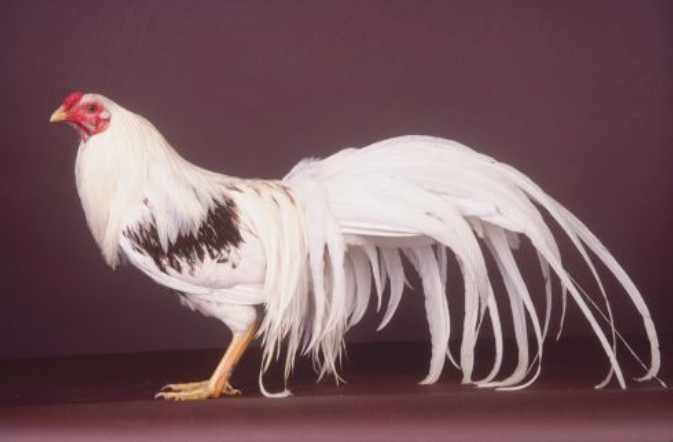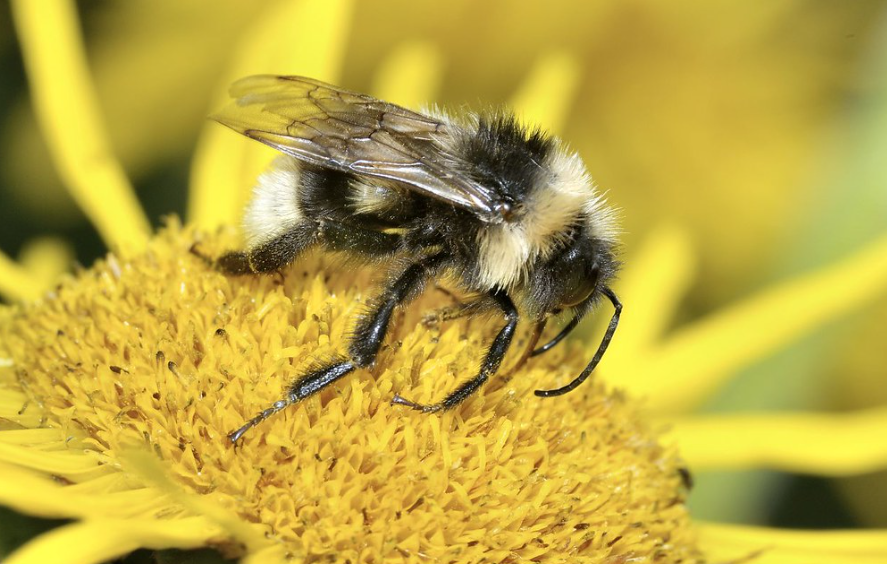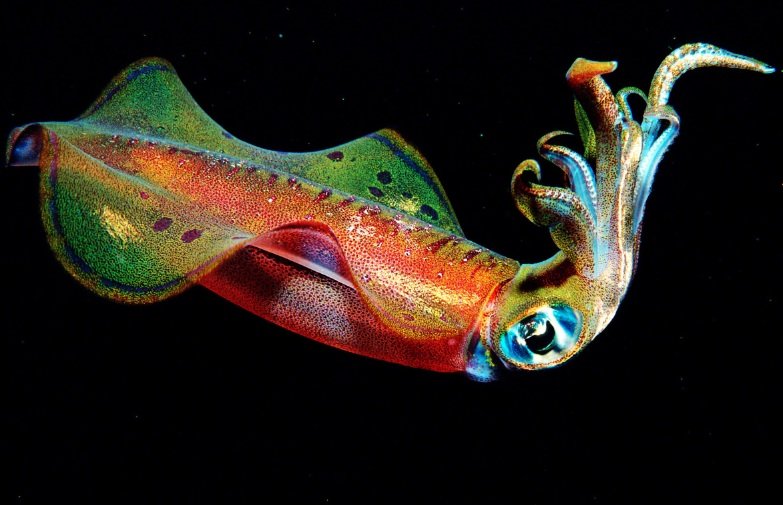
Intriguing facts about Squid
Explore the captivating world of the squid, a remarkable mollusk renowned for its intellect, flexibility, and gastronomic adaptation. Squid, with its captivating nature, intrigues scientists and culinary fans throughout the globe, from the ocean’s depths to gourmet kitchens. Examine the structure, actions, and ecological importance of squid, providing insights into its function within marine environments and its impact on human society.
Explore delectable squid recipes, including traditional calamari and inventive Asian-inspired dishes, to satiate your appetite and spark culinary ingenuity. If you are a marine scientist, a seafood enthusiast, or a home chef looking for culinary inspiration, squid provides a plethora of information and gastronomic pleasure readily available to you. Explore the fascinating realm of squid now and discover a wealth of knowledge and culinary delights!
Remarkable Camouflage Abilities of Squid
Squid’s capacity to change color and blend in with their surroundings is one of its most amazing characteristics. Specialized cells known as chromatophores, which include pigments that may expand or shrink to change the squid’s appearance, are responsible for this amazing adaptability. Because of their ability to blend in with their environment, squid have a considerable edge when it comes to hunting or escaping predators.
Cognitive Abilities and Speed of Squid
Squid have highly developed brains and a sophisticated neurological system, making them very intelligent animals. They have sophisticated problem-solving abilities and have been shown to exhibit actions that suggest a certain amount of cognitive capacity. In addition to their remarkable speed and agility, squid may reach up to 25 miles per hour in some species. These amazing animals continue to enthrall scientists and researchers worldwide with their distinctive qualities. They are both predators and prey in marine environments.
You may also like:
1: Top 10 Facts About Blue Tang Fish
2: Top 10 Facts About Butterfly Fish
3: Top 10 Facts About Box Jellyfish
4: Top 10 Facts About Blue Catfish
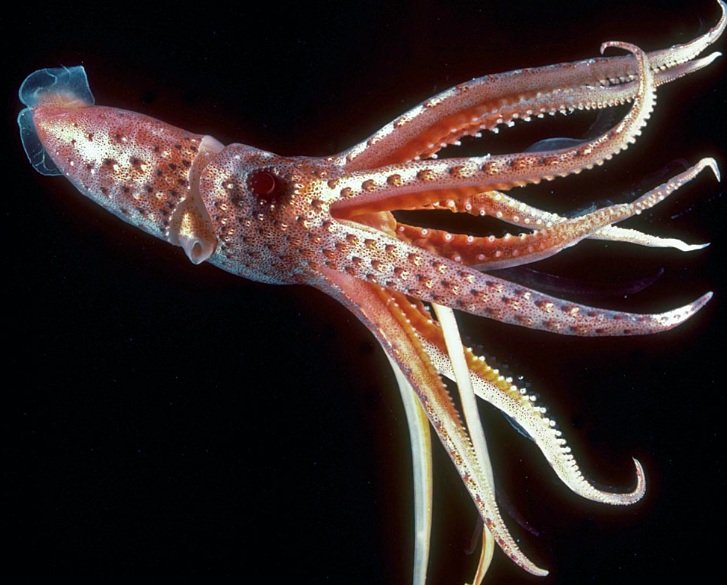
Unveiling Fascinating Facts About Squid
Squid are amazing aquatic animals with a wide range of interesting features. These cephalopods, belonging to the class Cephalopoda, are characterized by their unique body structures and exceptional abilities. The soft mantle that covers squid’s elongated bodies contains their internal organs. They also have an unusual head with two huge eyes, two tentacles, and eight arms that have suction cups on them. Thanks to their suction cups, they can catch prey and precisely traverse their environment.
Squid are really amazing animals with an abundance of distinct characteristics and tendencies. Their diverse range of sizes, intellect, ecological significance, ancient ancestry, and adaptability make them an intriguing research topic. Below are a few astounding squid facts.
Spectacular Diversity of Squid
The world’s waters are home to fascinating animals called squid. The unique traits and behaviors of these creatures have fascinated both scientists and enthusiasts.
Diverse Sizes and Species of Squid
The size of squid varies greatly; the smallest kind is called a pygmy, and it is just a few centimeters long. The largest type is called a colossal, and it may grow up to be 14 meters long. The remarkable range of sizes seen in these organisms is evidence of their flexibility and versatility. Moreover, with over 300 species recognized globally, squid display an astounding diversity of species. From the vivid colors of the showy cuttlefish to the secretive nature of the vampire squid, every species has distinctive qualities of its own.
Intelligence and Communication of Squid
Since their neural systems are so well developed, squid are very clever animals. Their intricate vocabulary of color changes, body postures, and even electrical impulses allows them to communicate with one another. According to studies, squid have a cognitive level comparable to that of some vertebrate species, demonstrating the ability to learn and solve problems. It is actually amazing how well they adjust to changing circumstances and maneuver through intricate surroundings.
Ecological Importance of Squid
Squid play a critical role in maintaining marine ecosystem equilibrium. Due to their ravenous appetite, they aid in regulating the number of smaller creatures, thereby avoiding overpopulation and fostering biodiversity. Furthermore, a variety of marine animals, such as seagulls, dolphins, and whales, depend on squid as a food source. Their critical role in the marine food system stems from their nutritional value and abundance.
Know some other marine animals:
1: Top 10 Facts About Blackfin Tuna Fish
2: Top 10 Facts About Blacknose Shark Fish
3: Top 10 Facts About Bonito Fish
4: Top 10 Facts About Bone Fish
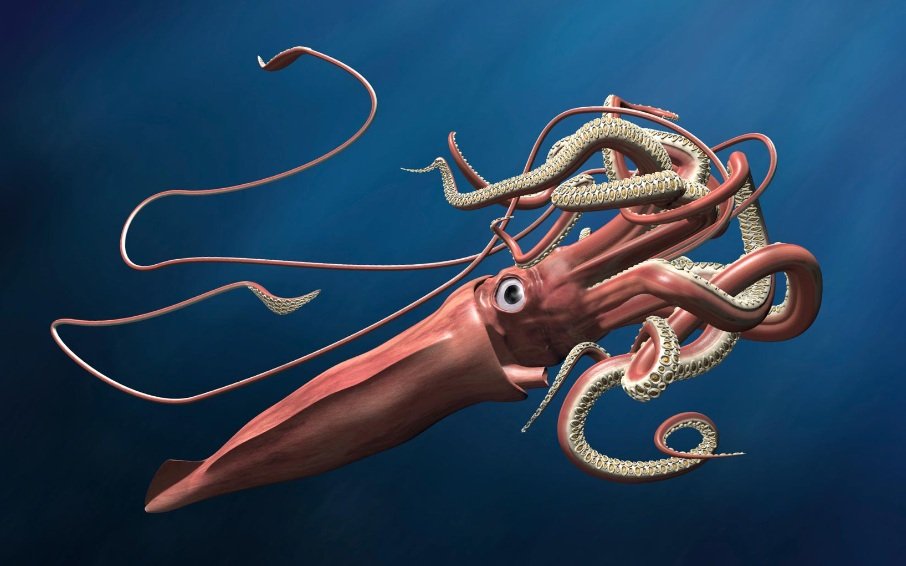
Ancient Ancestors of Squid
Fossil evidence for squid extends over 400 million years into their evolutionary history. Throughout history, these extinct animals have persevered through several catastrophic extinctions and have adjusted to diverse environmental shifts. Squid fossils provide important insights into marine life history and aid in understanding the complex relationships that exist between various species.
FAQ (frequently asked questions) about Squid
Q: What is a squid?
Ans: A squid is a marine cephalopod mollusk notable for its elongated body, eight arms, and two longer tentacles.
Q: Where do squids live?
Ans: Squids inhabit oceans worldwide, from shallow coastal waters to deep seas.
Q: How do squids move?
Ans: Squids move using jet propulsion, releasing water through a siphon to drive themselves ahead.
Q: What do squids eat?
Ans: Squids are carnivorous and typically feed on fish, crabs, and other tiny marine creatures.
Q: How do squids protect themselves?
Ans: Squids have diverse defensive systems, including ink production to confound predators, quick color changes for camouflage, and jet propulsion to flee.
Q: How do squids reproduce?
Ans: Squids reproduce by external fertilization, with males conveying sperm packets to females using specialized tentacles.
Q: What is a squid’s life expectancy?
Ans: Squid lifespans vary by species, with some surviving barely a few months and others up to many years.
Q: Are squids intelligent?
Ans: Squids show complex behaviors and are considered intelligent invertebrates, capable of learning and problem-solving.
Q: What is the economic relevance of squids?
Ans: Squids are financially important because of their flesh, which is eaten globally, and their ink, which is used for culinary and artistic purposes.
Q: How do squids communicate?
Ans: Squids communicate using visual cues, body patterns, and maybe chemical signals; however, their communication mechanisms are still being investigated.
Our sources and references about Squid
1: Wikipedia
2: National Geographic
3: Smithsonian Ocean
4: Monterey Bay Aquarium
